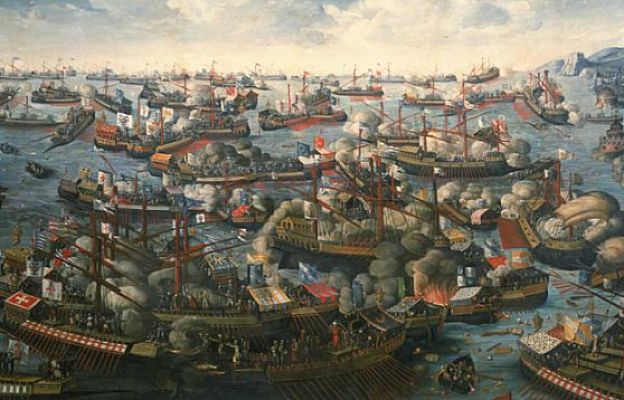
After Turkey signed the agreement on the delimitation of Mediterranean Sea Exclusive Economic Zones (EEZ) with the Libyan government in Tripoli on 27 November, pro-government journalists and politicians in Ankara proclaimed in unison that their country is returning to the times of the notorious Hayreddin Barbarossa Pasha. And in actual fact if that agreement ever was to enter into force, Turkey would assume control over the entire eastern Mediterranean Sea. This would both constitute a move against Europe's energy strategy and result in an increased risk of another attack by the Turkish demographic weapon.
Luckily, as usual the Turks got it wrong. Barbarossa was an Ottoman admiral, but he wasn't even originally from Turkey: he had Albanian and Greek roots. Nonetheless the domination of the Mediterranean Sea his empire enjoyed during its heyday was largely down to him and his victories against the Spanish fleet of Emperor Charles V. His conquests include a strategic port in Algiers, for a long time used by his ships to harass Europeans, rob and capture Christians to be then sold on slave markets. Barbarossa was appointed Pasha of Algiers but he never managed to set foot in Libya's Tripoli. In 1510 the city was conquered by the Spanish general Don Pedro Navarro and remained in Christian hands until 1551, five years after Barbarossa's death. It was a different Ottoman corsair, Turgut Reis, who captured the Libyan capital, which was then ruled by the Sultans for the next 150 years.
Historia magistra vitae est. The Ottoman Empire's Mediterranean Sea success was to a large extent made possible by divisions in Europe and in particular hostility between the Habsburgs and France, eager to ally itself with the Turks. As a result, pirates from Tripoli, Algiers and Tunis would attack European trade ships until the 19th century. Only two wars which the USA waged against Tripoli and Algiers in early 19th century and then the French conquest of Algiers put an end to these practices. In 1911 Tripoli was taken by the Italians. And today Turkey is eyeing Tripoli once again as it would put control of eastern Mediterranean Sea within its grasp - a threat Europe just could not afford to ignore. And by no means do I mean a return to piracy or the slave trade (even though the latter in blossoming in Libya, however the victims of this practice are mostly African rather than European). However, control over Libya and proceeding with the implementation of the EEZ agreement would undermine European plans associated with establishing a Cypriot – Egyptian – Israeli energy triangle. Even worse, it would put Turkey in control of the main immigration route from Africa to Europe.
In this context one should bear in mind that in 2015 Turkish special forces stimulated the mass influx of immigrants into Europe. In this way Ankara forced its hand and its ever more aggressive policy and bloody repressions against the Kurds are tolerated and Europe was persuaded to support the failing Turkish economy in the form of 6 billion euro, apparently to help refugees. Over the following years, Recep Tayyip Erdoğan, the Turkish president, continually blackmailed Europe, forcing it to be lenient with Ankara faced with the looming threat of an attack by a demographic weapon (a stream of immigrants). The situation in Syria is also a pretext for taking such actions, where Turkey is actually interested in annexing its northern reaches inhabited by Kurds. The north-western province of Idlib is also within its de-facto sphere of influence, and that is where Hayat Tahrir asz-Szam, or the Syruan Al-Kaida is the dominant force. There is no doubt that a Russian – Assad offensive in that region is only a matter of time. It will trigger waves of refugees heading towards Turkey and Erdogan will be handed another pretext to make further demands. And these are already reaching the heights of absurdity, as we have seen at the last NATO summit in London. There he threatened us, talking about blocking the defensive strategies of Poland and the Baltic states if other NATO members do not recognise YPG units as a terrorist organisation.
However, the problem lies in the fact that YPG, together with the USA defeated the Islamic State and today, many terrorists from that organisation are fighting against Syrian Kurds under Turkish leadership. This is somewhat reminiscent of the 16th century, however whereas it was the corsairs who fought on the side of the Ottoman Empire, today it is jihadists, who appear under various banners. And these may be the Islamic State, Al Kaida, Free Syrian Army or Syrian National Army. And their task is not only to conquest new territories for Turkey, but also to bring fear to Europe. An attack by the demographic weapon brings about an increased terrorist risk. And the recent Turkish efforts in Syria have already re-kindled the Islamic State. As thousands of imprisoned jihadists and their families remain in the hands of the Kurds, many of whom are citizens of EU states. Turkish bombing raids have allowed many of the former to escape to Turkey. And that is also where Al Kaida terrorists will head once Assad retakes Idlib. And thus Turkey will have its corsairs, and it will set them loose on Europe.
But this threat will become exponentially greater if Turkey assumes control over Tripoli, as that is where most boats to Europe are launched from and Turkey has already started moving jihadists from Syria to there. Since 2014 Libya has been gripped by civil war and torn between two opposing governments. That of al-Sarraj resides in Tripoli, and even though it is recognised by the international community, it only controls a small part of the country and is dependent on support from jihadist militias and weapon deliveries from Turkey. The other centre of power is a president in Tobruk, supported by General Khalifa Belqasim Haftar's Libyan National Army which is in turn backed by the United Arab Emirates, Egypt and Jordan, to name a few. The LNA is currently on the offensive and it has its sights set on Tripoli. However, Erdogan has announced that he is ready to send in his troops to prevent that.
It would be in Europe's interest if al-Sarraj's government was to fail and for Haftar to capture Tripoli. Firstly this would prevent Turkey from taking control of the immigration route from Africa and Libyan natural resources. Secondly the EEZ agreement which undermined European interests would be binned as the government in Tobruk would consider it to be invalid. And thirdly, a stabilised Libya, ruled by Haftar would be more likely to come to terms with Europe over stemming the influx of immigrants from Africa to Europe.
The EEZ agreement was doubly illegal as the government in Tripoli had no mandate to enter into it without the agreement of the government in Tobruk and on top of that it is in contravention of the 1982 UN Convention on the Law of the Sea, infringing upon the sovereignty of Greece and Cyprus. It is also another step towards Ankara's goal of taking over Cypriot Aphrodite gas fields. They are located near the Egyptian Zohr fields and the Israel's Leviathan. And that is why these three countries are cooperating with Europe's support, which is seeking access to the raw material produced there. American companies such as Noble Energy and Exxon Mobil are the main driving force behind prospecting. And Turkey is looking to change those plans.
Turkey's actions on the Mediterranean Sea and in Libya pose a threat to Greece, Cyprus, Egypt, Israel and the United Arab Emirates in particular but also to France (who has been quietly supporting Haftar for some time now) and Italy. To date the latter have been supporting al-Sarraj, which was a cause of tensions between Rome and Paris. However, the threat of Turkish domination in Tripoli caused Luigi Di Maio, the head of Italian diplomacy, to meet Haftar and the Libyan field marshal is now expected in Rome. Furthermore, the Turkish plans also indirectly undermine the interests of the USA and the entire Europe, even though some of these countries do not seem to realise.
Of course, one may also adopt a philosophy assuming further submission to Turkey. As it threatens migrant attacks, as it is able to send jihadist "corsairs" to Europe, let us give way, let it have what it wants to. It doesn't matter that then it will be able to put even more pressure on. And then we will give yield once again, welcome it to the EU until one day European law will be written in Ankara. The grand dreams of Mehmed the Conqueror, Suleiman the Magnificent and Kara Mustafa Pasha will then come true.
Europe's weakness lies in its divisions, internal disputes and the fact that the individual countries' perception of the threat is different. Exactly as it was centuries ago, when the Ottoman Empire began its expansion on out continent. Byzantium and the Balkan nations stood alone against the Turks heading for our continent. In 1396 Sigismund of Luxembourg near Nicopolis, as king of Hungary was not supported by European knights en-force and the battle ended in defeat. A similar situation took place half a century down the line when the Polish – Hungarian king, Władysław of Varna, was betrayed near Varna by the Venetians. No one helped the Hungarians in 1526 and the of Mohács was a catastrophe. Three years later, for the first time, the Ottoman armies stood at the gates of Vienna One hundred years later it was Poland's turn. In 1620 the Turks invaded Poland and the Grand Hetman of the Crown, Stanisław Żółkiewski, died at the Battle of Cecora. In 1672, Poland became a Turkish fiefdom. Luckily only briefly.
We owe the fact that today we do not speak Turkish and that all churches have not been changed into mosques to the danger being finally noticed. In 1565, 14 years after Turgut Reis conquered Tripoli, Order of Saint John knights withstood the siege of Malta and survived until the Spanish and Italian relief arrived. 6 years later, near Lepanto, the Christians coalition crushed the Ottoman fleet, putting an end to Sultan Selim II's dreams of total control of the Mediterranean Sea. In 1621, Polish, Lithuanian and Cossack soldiers, led by hetman Jan Karol Chodkiewicz, stopped the Turkish invasion dead in its tracks. Half a century later, in 1572, John III Sobieski, at the same place, cleared the shame of the Treaty of Buchach, and released Poland from subordination to the Sultan and on 12 September 1683 defeated Kara Mustafa near Vienna. The time is ripe for Lepanto 2020!

Witold Repetowicz
Middle East, terrorism and geopolitics expert, Jagiellonian University Faculty of Law and Administration graduate, PhD Student at the War Studies University's Faculty of National Security, author of the "My name is Kurdistan" book as well as many reports from frontline areas in Syria and Iraq. Special interest in Iraq, Syria, Kurds, The Islamic State, Islamic extremism, refugees and migration. Interest in Africa and former the USSR. K. Pułaski Foundation expert, regularly writes for Tygodnik Do Rzeczy and the Polska Zbrojna monthly. Also active in other media.
